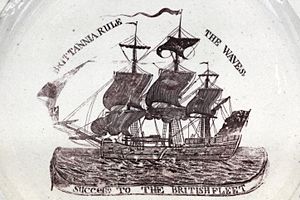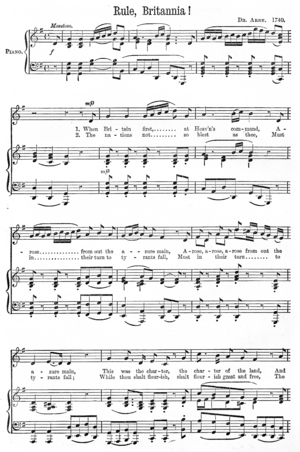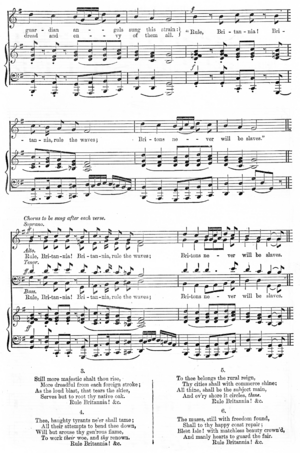Rule, Britannia! facts for kids
"Rule, Britannia!" is a famous British patriotic song. It started as a poem in 1740 by James Thomson. The music was added in the same year by Thomas Arne. This song is most linked to the Royal Navy, which is Britain's navy. But the British Army also uses it.
Contents
The Play Alfred
The song "Rule, Britannia!" was first heard at the end of a play called Alfred. This play was a type of musical show, also known as a masque. It was about a famous old king, Alfred the Great.
James Thomson and David Mallet wrote the play together. It was first performed on August 1, 1740, at Cliveden. This was the country home of Frederick, Prince of Wales.
The play was created to celebrate two things. It marked the time when Frederick's grandfather, King George I, became king. It also celebrated the birthday of Princess Augusta.
Song Lyrics
The words below come from a book called The Works of James Thomson, published in 1763. They are the full lyrics from the original play Alfred.
When Britain first, at Heaven's command
Arose from out the azure main;
This was the charter of the land,
And guardian angels sung this strain:
"Rule, Britannia! rule the waves:
"Britons never will be slaves."
The nations, not so blest as thee,
Must, in their turns, to tyrants fall;
While thou shalt flourish great and free,
The dread and envy of them all.
"Rule, Britannia! rule the waves:
"Britons never will be slaves."
Still more majestic shalt thou rise,
More dreadful, from each foreign stroke;
As the loud blast that tears the skies,
Serves but to root thy native oak.
"Rule, Britannia! rule the waves:
"Britons never will be slaves."
Thee haughty tyrants ne'er shall tame:
All their attempts to bend thee down,
Will but arouse thy generous flame;
But work their woe, and thy renown.
"Rule, Britannia! rule the waves:
"Britons never will be slaves."
To thee belongs the rural reign;
Thy cities shall with commerce shine:
All thine shall be the subject main,
And every shore it circles thine.
"Rule, Britannia! rule the waves:
"Britons never will be slaves."
The Muses, still with freedom found,
Shall to thy happy coast repair;
Blest Isle! With matchless beauty crown'd,
And manly hearts to guard the fair.
"Rule, Britannia! rule the waves:
"Britons never will be slaves."
"Married to a Mermaid"
In 1751, David Mallet used parts of "Rule, Britannia!" again. He took out three of the original six verses. He then added three new ones written by Lord Bolingbroke. These new verses became the repeated chorus of a funny song called "Married to a Mermaid."
This new song became very popular. It happened when Mallet put on his play Britannia at the Drury Lane Theatre in 1755.
Married to a Mermaid tells the story of a young man. In some versions, he is a sailor or a farmer. He falls off a ship and marries a mermaid. Later, he comes up from the sea. He says goodbye to his friends and his ship's captain. It is a traditional song for sailors. Choirs often sing it, and it has many different versions of the words.
Here are some lyrics from a version sung by Arthur Lloyd:
'Twas on the deep Atlantic,
Midst Equinoctial gales;
This young farmer fell overboard
Among the sharks and whales;
He disappeared so quickly,
So headlong down went he,
That he went out of sight
Like a streak of light
To the bottom of the deep blue sea.
Singing Rule Britannia,
Britannia rules the waves
Britons never, never, never shall be slaves...
We lowered a boat to find him,
We thought to see his corse,
When up to the top he came with a bang,
And sang in a voice so hoarse,
'My comrades and my messmates,
Oh, do not weep for me,
For I'm married to a mermaid,
At the bottom of the deep blue sea.'
Singing Rule Britannia,
Britannia rules the waves
Britons never, never, never shall be slaves...
He said that as he went down,
Great fishes he did see;
They seemed to think as he did wink,
That he was rather free.
But down he went so quickly,
Saying, Tis all up with me,'
When he met a lovely mermaid
At the bottom of the deep blue sea.
Singing Rule Britannia,
Britannia rules the waves
Britons never, never, never shall be slaves...
She came at once unto him,
And gave him her white hand,
Saying, 'I have waited long, my dear,
To welcome you to land.
Go to your ship and tell them,
You'll leave them all for me;
For you're married to a mermaid
At the bottom of the deep blue sea.'
Singing Rule Britannia,
Britannia rules the waves
Britons never, never, never shall be slaves...
The wind was fair, the sails set,
The ship was running free;
When we all went to the captain bold,
And told what we did see.
He went unto the ship's side,
And loudly bellowed he,
'Be happy as you can, my man,
At the bottom of the deep blue sea.'
Singing Rule Britannia,
Britannia rules the waves
Britons never, never, never shall be slaves.
Sometimes, the chorus from Rule, Britannia! is sung like this in the song:
Singing Rule Britannia,
Britannia rules the waves
Britons never, never, never shall be
Married to a mermaid
At the bottom of the deep blue sea
In this song, "Married to a mermaid" is often said as "marry-ed to a mer-may-ed." Also, "captain" is sometimes said as "cap-i-tain." Some versions use "broad Atlantic" instead of "deep Atlantic."
What the Song Means
"Rule, Britannia!" quickly became famous on its own. It was first heard in London in 1745. It became so popular that a famous composer, Handel, used its tune in his own music the next year.
The song became a strong symbol of Britain. It showed the idea of Britain as a powerful country. This idea was based on trade, national pride, and freedom. The song suggests that Britain's strong navy helps keep its people free. An island nation with a powerful navy does not need a large army. A large army was sometimes seen as a threat to people's freedom.
When the song first appeared, Britain did not yet "rule the waves." It was more of a hope or a goal. The song was written during the War of Jenkins' Ear. This war was about Spain attacking British trading ships. The words of the song encouraged Britain to become a strong naval power. By the end of the 1800s, the Royal Navy truly was a dominant force. The song's words then became a proud statement of fact.

The song's title is often written as "Rule Britannia," without the comma or exclamation mark. This changes the meaning slightly. The original "Rule, Britannia!" is a command or an instruction. It means "Britannia, you should rule the waves!" But when it's written as "Britannia rules the waves," it sounds like a statement of fact: "Britannia already rules the waves."
This change in words happened during the Victorian era. At that time, Britain truly did rule the waves. So, people no longer needed to be told to rule them.
The song gained even more meaning in 1945. This was at the end of World War II. It was played when the Japanese imperial army officially surrendered in Singapore. Military bands from Australia, Britain, and America played it.
"Rule, Britannia!" is often played at the BBC's Last Night of the Proms. This is a famous music concert. A guest singer usually performs it. For many years, it was the last part of Sir Henry Wood's 1905 Fantasia on British Sea Songs.
Other Music Using the Tune
Many composers have used or quoted Thomas Arne's tune from "Rule, Britannia!" in their own music.
- Ludwig van Beethoven wrote a set of variations for piano based on the melody. He also used it in his piece "Wellington's Victory".
- The music was used for an American patriotic song called Rise Columbia.
- Richard Wagner wrote an overture (a piece of music for an orchestra) based on the tune in 1837.
- Johann Strauss I used the song's tune at the start of his 1838 waltz, "Homage to Queen Victoria of Great Britain." He also included the British national anthem, "God Save the Queen".
- The French composer Alexandre Guilmant included this tune in his organ music.
- Arthur Sullivan, a very popular British composer, used parts of "Rule, Britannia!" in his comic operas. For example, he used it in Utopia Limited and The Zoo. He also added it to the end of HMS Pinafore in 1887 to celebrate Queen Victoria's Jubilee.



